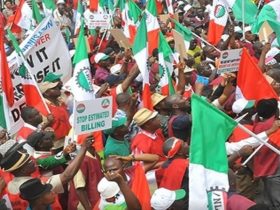 The removal of fuel subsidy in Nigeria has sparked various reactions and opinions from the public. While some express dissatisfaction and concerns, others support the decision.
The removal of fuel subsidy in Nigeria has sparked various reactions and opinions from the public. While some express dissatisfaction and concerns, others support the decision.
Since President Tinubu’s announcement of the subsidy removal, the economic landscape of Nigeria has undergone a dramatic change, impacting citizens in distressing ways.
Almost immediately, long queues formed at petrol stations in major cities, with many unaware of the cause behind the sudden fuel scarcity. The prices of essential goods and services have soared, affecting the daily lives of Nigerians. The removal of fuel subsidies has the potential to trigger inflation, reduce economic welfare, hinder economic growth, and shrink household income. As petroleum product prices increase, the purchasing power of consumers diminishes, causing a ripple effect throughout the economy and driving up the cost of living.
Tragically, even before the official implementation of the subsidy removal, some unscrupulous petroleum marketers seized the opportunity to exploit the situation.
Reports emerged of petrol being sold for as high as N700 per liter, well above what was justified. The profiteering and price gouging demonstrated a callous disregard for the plight of Nigerians. Fuel prices were never meant to reach such exorbitant levels, and the actions of these sellers only intensified the suffering of already burdened citizens
Gbadebo Rhodes Vivour, the immediate past Labour Party governorship candidate of Lagos state, and the Trade Union Congress both issue warnings against removing the subsidy at this time.
Adewole Adebayo, the presidential candidate of the Social Democratic Party, criticizes the timing and execution of the subsidy removal.
Oluseun Onigbinde, a director at BudgIT, emphasizes the need for government accountability and reducing wasteful spending.
On social media, questions arise about the government’s transparency and management of the funds saved from the subsidy removal.
Christopher Ogbonna emphasizes the importance of finding the least harmful impact on the masses, while @UcMajesty suggests outlining alternative frameworks and engaging stakeholders.
These diverse perspectives highlight the significance of transparency, accountability, and effective communication in navigating the complexities of removing the fuel subsidy in Nigeria.
Furthermore, in response to the subsidy removal, the Nigerian Labour Congress NLC is declaring a nationwide strike starting on June 7, 2023.
The impact of the subsidy removal is keenly felt by commuters and transport users. Previously affordable journeys have become prohibitively expensive. In Abuja’s Nyanya Axis, the average cost of commuting to the Central Business District has skyrocketed from around N200 to between N400 and N500, or even more depending on passenger load. An anonymous respondent expressed the struggle of having to miss a training session due to the need to save cash for food, as the doubled transportation cost drained his resources. Similarly, in Lagos, Mr. Victor Afedia lamented the sharp increase in transport fares, which now range from N1000 to N1500 for routes that were previously charged at N300 or N400.
The scarcity of commercial vehicles on the road has forced many to resort to walking long distances to work, further compounding the hardships faced by ordinary Nigerians. Some resort to sleeping at work to save on transport costs, while others seek remote job opportunities to cope with rising fares.
The removal of the fuel subsidy has unleashed a wave of economic hardship and deepened the suffering of the Nigerian people. The immediate consequences are visible in the exorbitant fuel prices, inflationary pressures, and the mounting cost of living. The hardships faced by commuters and transport users highlight the ripple effect that such policy decisions have on the everyday lives of citizens. As Nigerians grapple with these burdens, their resilience and determination to find solutions amidst the turmoil serves as a testament to their enduring spirit.









Leave a Reply